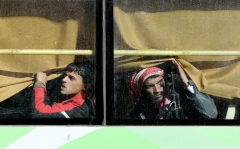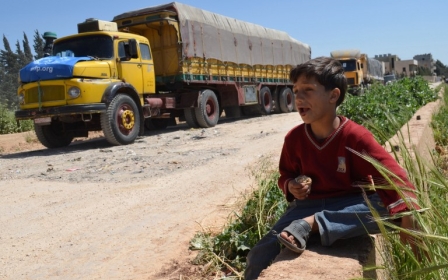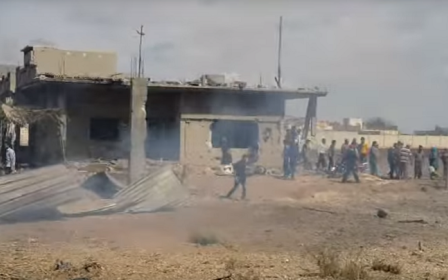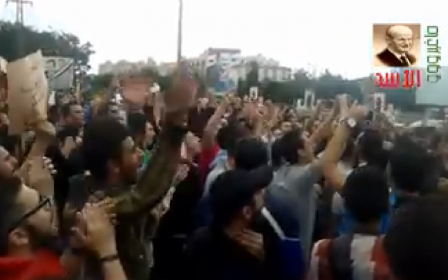Homs residents' choice: Life as refugees or prisoners in own homes

Hours before the buses arrived on Wednesday to evacuate residents from Waer, the last rebel-held district in Homs, many trapped there by government forces were still debating whether to stay or to go.
To remain would be to stay without any protection from rebel fighters, 2,000 of whom are expected to leave the stronghold after two years of negotiations with the Syrian government.
The UN, too, can’t guarantee the residents’ safety because it does not have a mandate to provide the required protection, nor can it monitor ceasefire agreements, said Rim Turkmani, a senior research fellow at the London School of Economic's Department of International Development, who said she spoke to residents on Tuesday.
But to go would mean leaving home for northern Syria where humanitarian conditions were even worse, Turkmani said.
“Ideally, we always advocate that people should not leave their area. They should stay and find an agreed framework for them to stay and means to protect them,” said Turkmani, who is from Homs and has documented local negotiations and agreements in Syria since early 2012.
“But the reality is that there is no one to protect these people, no one to provide them with any guarantees,” she said. “So for many, the best option was simply to leave.”
Push for ceasefires
Waer saw some of the first protests in 2011 and, as rebel fighters took control of most of the city, it was nicknamed the “capital of the revolution”.
In recent years, government forces, supported by Hezbollah fighters, have steadily taken back districts in Syria’s third largest city, leaving only Waer. Once it is evacuated, Homs will return to complete government control.
Buses will head from Homs to the Qalaat al-Madiq area in the central Hama province, then onto the northwestern province of Idlib, according to the Syrian Observatory for Human Rights. Idlib province is held by the Army of Conquest rebel alliance, which includes al-Qaeda affiliate al-Nusra Front.
For more than two years, Waer’s population – which has shrunk from a pre-war 300,000 to about 75,000 - has been under siege. They have received little food and humanitarian aid, and have grown accustomed to paying high prices for remaining goods and services in their three-square kilometre neighbourhood.
The UN has been pushing for such localised ceasefires as broader efforts have failed to end Syria's war, but some have expressed reluctance towards them.
"I’m a bit disappointed by the international community," Hiya, a former resident of Homs, told BBC World on Wednesday. "I’m a bit losing hope from the benefit of such a ceasefire. For me, it feels like we were protesting and we sacrificed a lot not to be back under the control of the regime.
"We are stuck in this place where either we have to continue fighting or dying or we have to be under the control of the regime and either of them is not why we revolted," she said.
Other local ceasefire negotiations currently underway in Syria include those in Eastern Ghouta and Zabadani.
Agreement unsigned
In Homs, Wednesday's evacuation is only the first of a three-phase agreement – one that hasn’t even been signed and is still vulnerable to spoilers that often follow progress in negotiations, Turkmani said.
She said an official ceasefire and the release of prisoners and those who have been kidnapped were to follow.
For some locals debating whether to stay or go, their decision, said Turkmani, has hinged upon whether their local peace would ultimately make a difference to Syria. Or whether they would simply be leaving their home.
“They don’t see a horizon. So what have they achieved after all?” said Turkmani. “They want to see this becoming part of a wider national solution, not just a small isolated step.”
“If there is not a ceasefire, the other alternative is war. So ceasefire is always a good idea. It means you are not killing each other," she said. "But in the long term, these peoples should be part of the overall political framework. [Ceasefires] shouldn’t be done each on its own.”
Those who have decided to stay, she said, faced the uncertainty of being arrested or bombed at any moment. Those that have gone - including several children who were bombed earlier this year on a playground and have been waiting for operations - simply face uncertainty.
“It’s always good that there are talks and things are resolved through dialogue and negotiation," she said.
"But it is sad to see all of those people leaving, especially the families ... especially knowing where are they going. The situations in the areas where they are going is even worse. Humanitarian-wise, the situation is also difficult. So I find it sad.”
New MEE newsletter: Jerusalem Dispatch
Sign up to get the latest insights and analysis on Israel-Palestine, alongside Turkey Unpacked and other MEE newsletters
Middle East Eye delivers independent and unrivalled coverage and analysis of the Middle East, North Africa and beyond. To learn more about republishing this content and the associated fees, please fill out this form. More about MEE can be found here.





